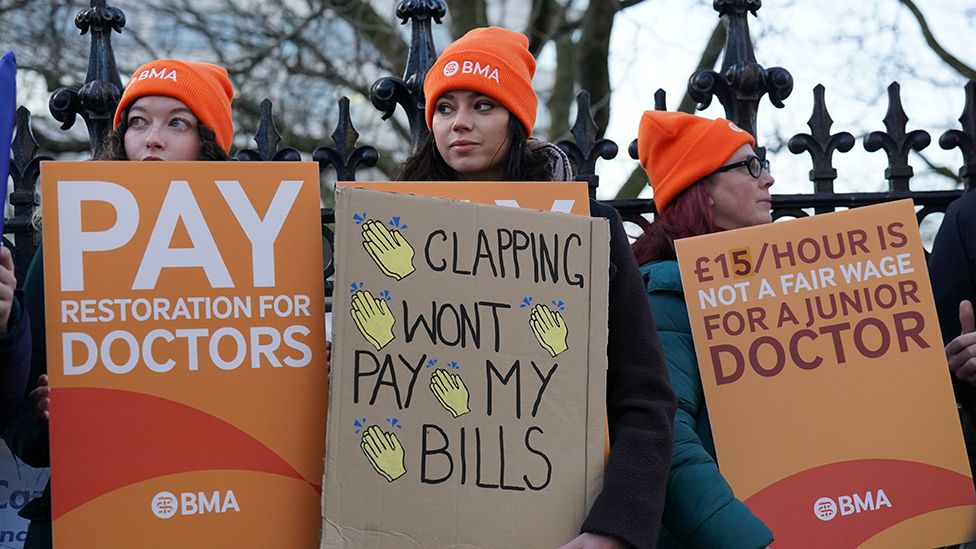ARTICLE AD BOX
 Image source, PA Media
Image source, PA Media
Junior doctors have walked on the first day of a six day walkout
By Nick Triggle
Health correspondent
NHS bosses have made more than 20 requests for striking junior doctors in England to be allowed to cross the picket line to help out services.
None of the requests made on the first strike day have been granted so far by the British Medical Association (BMA).
The union accused NHS bosses of misusing the system known as derogation and bowing to political pressure to undermine the strike.
But NHS England said they were genuine requests for help.
It said the health service was under huge pressure after the six-day walkout began on Wednesday, and NHS bosses were trying everything they could to protect patients and keep struggling services safe.
"Given this period of industrial action coincides with the most difficult time of year for the NHS, it is to be expected that more senior medical leaders will ask for allowances to be made to ensure safe levels of cover," the spokesman added.
The requests are made by individual departments so some NHS trusts are thought to have made more than one request. Only one request is under active consideration.
Most involve emergency care areas, such as A&E units.
This is the ninth walkout - and longest ever - by junior doctors, and before this stoppage only a handful of requests had been made.
Just one was granted - to Somerset's Weston General Hospital in April - and that was only done temporarily as the BMA said it was misled about the scale of the problem.
In a letter to NHS England boss Amanda Pritchard on Wednesday, BMA leader Prof Philip Banfield said in many cases insufficient information was being provided by the NHS to judge the merits of the request.
He said this was "undermining" the derogation process and placing the BMA in an impossible position.
"We are increasingly drawing the conclusion that NHS England's change in attitude towards the process is not due to concerns around patient safety, but due to political pressure to maintain a higher level of service and undermine our strike action."
The trusts that made the requests are not being named.
But it is clear a number of areas are facing difficulties.
Routine services have been scaled back to allow senior doctors to be drafted across to emergency care to provide cover.
But several NHS trusts reported significant waits in A&E, with some declaring a critical incident, meaning bosses were concerned they could not provide critical services for patients.
Queen Alexandra Hospital in Portsmouth said its A&E department was "full" as it declared a critical incident - its third in three months.
In Nottinghamshire, the entire Nottingham and Nottinghamshire NHS system declared a critical incident at 16:30 GMT.
Cheltenham A&E has been closed with patients diverted elsewhere, and Bolton NHS Foundation Trust said it was facing "extreme pressure" with waiting times in A&E of "up to 11 hours".
Warwick Hospital warned it was under "extreme heightened pressure", while Airedale Hospital said its emergency department was "exceptionally busy".
Health officials in East Sussex, South Tees, Gateshead, Greater Manchester, Berkshire, Rotherham and Harlow in Essex also reported being "busy".
Are you a junior doctor with a view on the strike? Are you a patient affected? Email haveyoursay@bbc.co.uk.
Please include a contact number if you are willing to speak to a BBC journalist. You can also get in touch in the following ways:
If you are reading this page and can't see the form you will need to visit the mobile version of the BBC website to submit your question or comment or you can email us at HaveYourSay@bbc.co.uk. Please include your name, age and location with any submission.

 1 year ago
37
1 year ago
37








 English (US) ·
English (US) ·